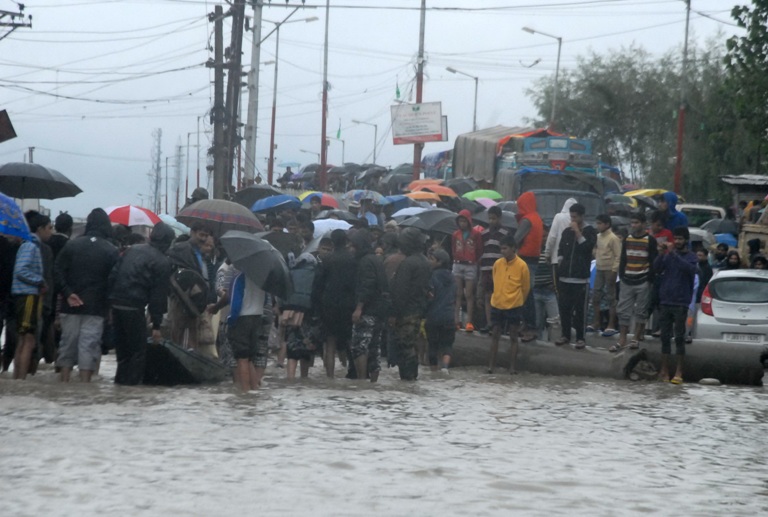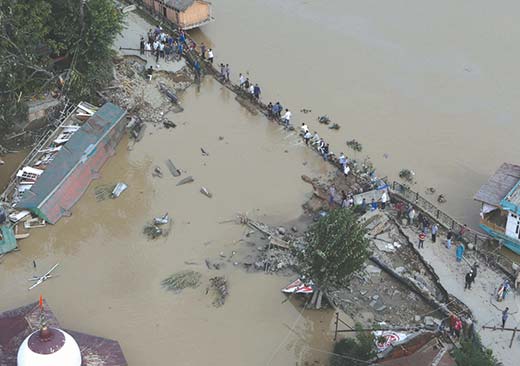SRINAGAR: The Saini community of Jammu has hit the roads to protest against the government’s decision to include them in the list of other castes which are entitled to 4 per cent reservation in jobs and professional educational institutions in the Union Territory.
Following protests by the community, which lives in certain pockets along the International Border (IB), the Jammu and Kashmir government had to put the whole list in abeyance till further orders.
The Saini community in parts of Jammu comprises about 60,000 – 70,000 people. They call themselves Chandravanshi Rajputs and descendants of Maharaja Shoor Sain of Mathura, grandfather of Lord Krishna.
Last Monday, a number of the Saini community elders led by Pritam Singh Saini held a dharna at Delhi’s Jantar Mantar to mark their protest on the issue, The Indian Express reported.
Many youth from the community held protests at the Jammu and Kashmir Socially and Educationally Backward Classes Commission’s office in Jammu, which recommended to the government to include Sainis in the list of other quota-entitled backward communities.
“Our protests at the village level are continuing, especially in villages like Kool (Arnia) and Sarora (Jammu) where the community has sizeable numbers,” said Suksham Saini, president of the youth wing of the All J&K Kashtriya Saini Sabha. “To listen to our views, the Backward Classes Commission has now called us on December 6.” The Commission’s chairman Justice G D Sharma, a retired High Court judge, refused to say anything on the matter.
Accepting the Commission’s recommendations, the Jammu and Kashmir government had on October 19 issued an order including the Saini community along with over a dozen others in the list of the “Socially and Educationally Backward” communities, increasing their total number to 42 in the UT. All these communities together are entitled to 4 per cent reservation in government jobs and admissions to professional colleges.
Through the same order amending the Jammu and Kashmir Reservation Rules-2005, the government has extended the benefits of 4 per cent reservation to Pahari people on the basis of their ethnicity and not language. Quoting directions from J&K Lt Governor Manoj Sinha for carrying out amendments in the Reservation Rules, a notification dated October 19, 2022, issued by commissioner-secretary of the social welfare department, Sheetal Nanda, stated that “in the Jammu and Kashmir Reservation Rules-2005, words ‘Pahari Speaking People (PSP)’, wherever appearing, shall be substituted with ‘Pahari Ethnic People’.”
However, the government has now put that order in abeyance, with officials saying that another notification would be issued. “It shall come into force from the date as may be notified by the government,’’ an official added.
Opposing their inclusion in the list of other backward castes, Sainis have questioned the Commission’s recommendations. “We have even filed an RTI seeking as to what was the criteria applied and survey conducted by the Commission before recommending our community into the list of socially and backward classes,’’ said Suksham Saini.
Suksham said the community does not fulfill any of the criteria laid down by Mandal Commission for the identification of social, educational and economic backwardness for extending reservation. “Some of these criteria are that such a community has 25 per cent members houseless, marry girls below 17 years, its womenfolk travel at least half km to fetch drinking water and 25 per cent of them work as labourers, besides a high rate of school dropouts in the 5-14 year age group,” he said.
“On the contrary, most members of the Saini community own agricultural lands, have hand pumps installed to get underground water at home and have a good literacy rate,” Suksham said. Asking the government to give this benefit of reservation to some other “deserving community”, he said that “It has been a matter of shame for us to get ourselves called ‘backward’ just for the sake of getting reservation especially when members of our community are competent enough to compete with other upper castes in recruitment in government jobs and admissions in professional colleges.”















